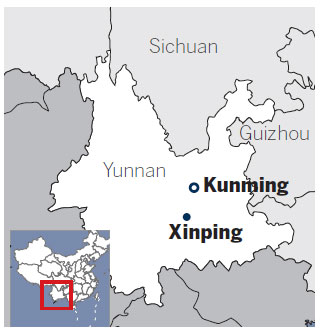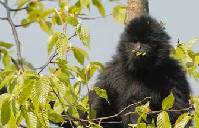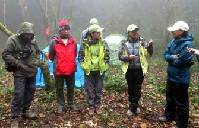Nature the great educator
Although few participants of the recent trek on the Ailao Mountains (Ailaoshan) managed to hear the western black-crested gibbons' duets, no one seemed to regret taking part.
|
|
|
|
It was the first time Benjamin Rawson had trekked through a forest in China. The Australian primate researcher, who lives in Vietnam as FFI's Indo-Burma primate conservation program manager, was surprised by Ailaoshan forest's "good condition".
"Here I saw almost no trace of human activity - no signs of logging and poaching," he says. "It is quite different to the reserves I visited in Vietnam."
It was the third time for Bill Bleisch, a biologist from the United States, to trek in the Ailao Mountains. As an expert with China Exploration and Research Society, an environmental NGO based in Hong Kong, he plans to explore the trails in the area as much as possible to map out a classic trekking route, like the Appalachian Trail in the US, for China.
"I have explored about 100 km of trails in Ailaoshan," Bleisch says. "After this event, I will keep walking for another four or five days and hopefully we can expand the trail system we already know."
Fang Wei, a researcher with Kunming Institute of Botany, discussed with Yang Xianming, director of the Ailao Mountains National Nature Reserve's Xinping Bureau, opportunities to cooperate in the future. The reserve's botanical survey, completed in 1980s by the line transect method, recorded about 1,300 species of seed plants in the "botanical treasure trove".
"The number is certainly too small for such well-protected forests on Ailaoshan," Fang says. "By comprehensive surveys, I think it will easily surpass 3,000."

Zhao Hong, an environmental education trainer from Friends of Nature, the oldest environmental NGO in China based in Beijing, was happy her promotion of "leave no trace" camping during the trek achieved positive feedback from the participants. Many of them followed "leave no trace" principles all the way through the walk.
The patrolmen built a temporary toilet at every campsite. Instead of burning unrecycled garbage at the camp, all participants took their garbage out of the reserve. Some even sealed up peels and pork bones in plastic bags after their meals to take with them.
Li Qiang, head of Friends of Nature's birdwatching team, was a little disappointed with the number of bird species he recorded during the trek. "Most of the time I am too exhausted to watch birds. My binoculars and camera became a burden," he says. "But I'm happy there are people who are interested in birdwatching and have started watching."
During the trek, he started teaching three college students about birds. Ma Qiuhua, a junior from Southwest Forestry University in Kunming, was one of Li's students. Besides birdwatching, she started painting pictures of the leaves of some rare trees, which she observed under the guidance of botanist Fang Wei, in her notebook.
"For a nature lover, what I saw and learned from the trek was mind-blowing," she says. "Back at school, I will share the experience with my classmates. Hopefully there will be more people who realize the importance of conservation."
Li Yingqing contributed to the story.
Related: Mountain patrolmen keep record from a distance
























